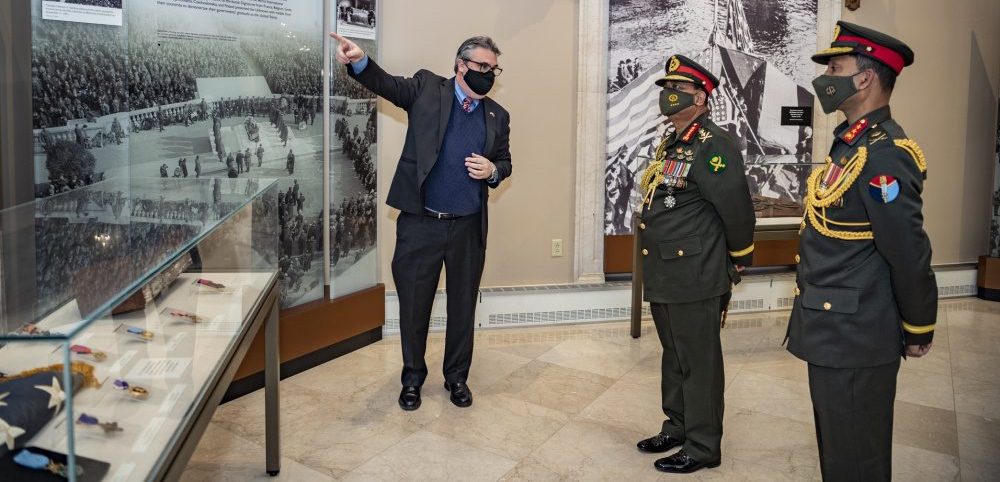
Exclusive
Human rights groups call for review of Bangladeshi UN troop deployments
The call comes after Al Jazeera revealed how Bangladesh, UN’s top troops provider, is secretly buying spy equipment.
6 Feb 2021
Seven prominent human rights groups have called on the United Nations to review its use of Bangladeshi peacekeeping troops after the world body denied claims by the country’s military that secretly bought mass surveillance equipment, exposed by Al Jazeera’s Investigative Unit, was used for peacekeeping missions.
The Al Jazeera investigation, All the Prime Minister’s Men, revealed how the Bangladesh armed forces, led by General Aziz Ahmed, bought intrusive mass surveillance technology, the so-called IMSI-catchers, from an Israeli company.
Bangladesh, which provides the largest number of UN military personnel, claimed the equipment was bought for peacekeeping missions, something the UN has vehemently denied.
The technology bought by Bangladesh can be used to track hundreds of mobile phones simultaneously, for instance during protests.
“In addition to a long pattern of extrajudicial killings, disappearances, and torture by Bangladesh security forces under Gen. Aziz’s control, new information suggests the Bangladesh military is making a brazen attempt at ‘blue-washing’ the government’s abusive surveillance tactics at home,” Human Rights Watch (HRW) UN director Louis Charbonneau said in a statement.
“The UN should conduct its own inquiry into the allegations and take a fresh look at the human rights record of all Bangladesh units and individuals involved in peacekeeping missions.”
The statement was co-signed by HRW, International Federation for Human Rights, Asian Human Rights Commission, World Organisation against Torture, Asian Forum for Human Rights and Development, Robert F Kennedy Human Rights, and Eleos Justice.
It also calls on the UN to make it clear that it is unwilling to be used as a coverup for human rights abuses in Bangladesh, and that increasing Bangladeshi troops’ deployments should be put on hold pending the results of a comprehensive review of the global body’s ties with the Bangladesh military.
General Ahmed is currently in the United States, where he will meet UN officials next week.
The rights groups called on the UN to use that meeting to discuss Al Jazeera’s findings.
All the Prime Minister’s Men
Ahmed was one of the main people featured in All the Prime Minister’s Men, which revealed how the general has been protecting his two fugitive brothers, Haris and Anis Ahmed, who absconded after they were found guilty of a 1996 murder.
Haris Ahmed, using a fake identity partially created with the help of the Bangladesh army, has been able to set up several businesses in Hungary, including fulfilling contracts for Bangladesh.
He also boasted about receiving bribes from officials to help them obtain high-ranking positions in the police force.
“Police work as our thugs. Who needs regular thugs,” Haris told an Al Jazeera undercover operative.
The Ahmed brothers, five in total, have long been closely linked to Bangladesh Prime Minister Sheikh Hasina.
RAB abuses
The film also showed Haris Ahmed boasting about having one of his rivals arrested using the Rapid Action Battalion (RAB), a paramilitary unit officially used for anti-terrorism operations.
In the recording, Haris Ahmed said: “My gangsters are RAB. I don’t need thugs, these [RAB] are my thugs.
“Pick someone up, detain someone. They make money, I make money. A straightforward deal,” he continued.
In their statement, the human rights organisations renewed calls for an investigation into the actions of RAB, a unit HRW has described as a “death squad”.
“Abuses by RAB, including extrajudicial killings, torture, and enforced disappearances, are well documented,” the statement said.
“The UN Committee Against Torture and the UN Human Rights Committee have repeatedly called for investigations into RAB and for it to be made into a purely civilian force.”
Before the release of the investigation, Al Jazeera reached out to all parties involved, including Hasina, the Ahmed brothers and several others. None responded.
After the release of the investigation, Bangladesh’s Ministry of Foreign Affairs issued a statement describing Al Jazeera’s findings as a “smear campaign” that was orchestrated by opponents of the regime based abroad.
It dismissed statements made by the brother of Bangladesh’s chief of army staff as baseless and said Haris Ahmed had no links to Hasina or any other state institution.